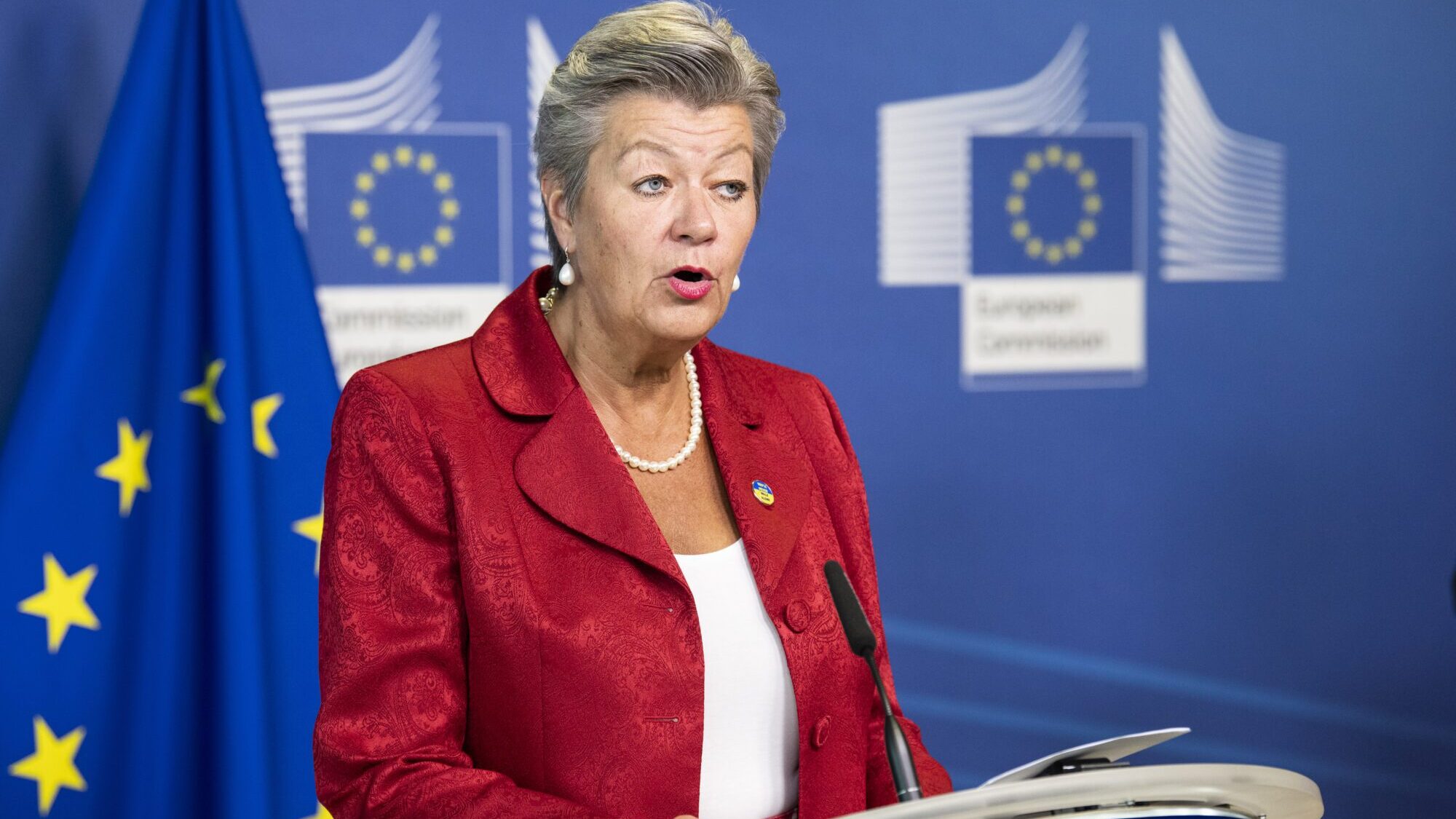
EU Home Affairs Commissioner, Ylva Johansson, during the press conference on Tuesday, June 6th.
Photo: Lukasz Kobus © European Union 2023.
Several EU member states are reluctant to sign off on the bloc’s “voluntary” migrant redistribution scheme, possibly putting the adoption of the entire new Migration Pact on hold, because it would force them to choose between accepting refugees or paying up to €20,000 for each migrant they turn down, Politico reported on Tuesday, June 6th. However, they won’t be able to rely on their veto power to prevent it from being introduced in a few weeks.
Despite all the promises made by various EU institutions, it seems no EU member state will be able to opt out of the bloc’s migrant relocation scheme—also known as the migrant quota system—designed to take the stress off frontline countries that absorb the most serious migratory pressure.
Whatever the outcome of this week’s negotiations, the Commission stated on Tuesday that the decision does not have to be unanimous, meaning that smaller EU countries won’t be able to veto its eventual adoption.
“No member state will ever be obliged to carry out relocations,” the draft proposal, circulated by the Council’s Swedish presidency ahead of the upcoming Council meetings, insists. While this sentence is technically true, it is not what some EU countries expected from it.
To get even the most fervent opponents to join in the initiative—all forms of which turned out to be a dead end in recent years, mainly due to consistent rejection from Central Europe and the reluctance to fulfill the pledges in the West—the new Migration Pact took a different approach.
Enter “mandatory solidarity,” as authors of the Pact call it, which is the “voluntary” choice between taking in refugees (in a total set by the Commission) or financial contribution to other member states. In theory, helping overburdened countries with personnel or equipment is also an option, but the details of that alternative are too vague to be considered as a way out for those who would rather participate in neither.
The main obstacle within the Council negotiations that were expected to produce an agreement on the Pact before the end of the month is that they weren’t given an exact figure to quantify the “financial contributions” yet. Rumors, of course, got out of the closed-door meeting of Eurocrats, and as the numbers grew, so did the resistance of Central Europe to the plan.
According to diplomats involved, the figures floated range between €10,000 to €22,000 per migrant. Some countries, like Austria and Slovakia, have started pushing for the lower end, arguing that based on certain OECD studies, ten thousand euros should be enough to cover a refugee’s integration. But the Council’s Swedish presidency is leaning toward the higher range, €20,000 or more.
After the first reports of the possible €22,000 price tag became public, Poland was the first country to categorically reject the scheme, with Prime Minister Mateusz Morawiecki and other officials arguing that his country has already taken in over a million Ukrainian refugees, therefore asking it to take more or pay up is simply unfair.
Other Central European countries, such as the Czech Republic, Slovakia, and Hungary, are equally against paying such a high price, seeing the forced choice between migrants and money as yet another intrusion of the EU into member states’ sovereignty.
Another big question that’s currently being discussed is the exact number of migrants that need to be redistributed under the scheme each year. According to diplomats, the Swedish presidency began courting the Council with the 30,000 figure, but some member states harbor some suspicion of this promise, given that over 80,000 illegal migrants arrived in the EU during the first four months of 2023.
Nonetheless, the Commission believes the Council can push through the pact even with a few objections. During a press conference on Tuesday, Home Affairs Commissioner Ylva Johansson reminded the audience that the decision will be taken by a qualified majority vote (needing just over half the member states, representing at least 65% of the EU’s population)—meaning that no individual country will have the power to veto the package in the end.
Commissioner Johansson also underlined that the whole reason for devising the common policy is to not let individual countries go their separate ways. “The main topic of the whole package is not mainly about a more even distribution, it’s about [having] a European migration policy, to have a united system,” the Eurocrat said, later adding that “you can’t ask some member states to do relocations while others have to do nothing.”
However, reaching a qualified majority still needs the support of countries like Germany and Italy, both of whom, at the moment, also have their own problems with the package. Berlin doesn’t like the idea of providing automatic exemption from border procedures to adult family members of children aged 12 or younger, while Rome—which would be the primary beneficiary of the quota system—fears that the high price tag would put the proposal in a political deadlock and leave it to deal with migrants alone.
The Migration Pact will be discussed first by the bloc’s internal ministers on Thursday, and from there—after reaching a preliminary agreement—will go to the Council summit to be finalized at the end of the month.
